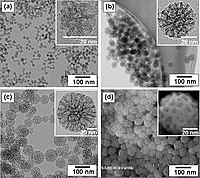
Photo from wikipedia
Abstract The depositional nanoparticles have a significant effect on the solid/liquid interaction, which affects the heat transfer rate across the interface. In this paper, molecular dynamics simulations are employed to… Click to show full abstract
Abstract The depositional nanoparticles have a significant effect on the solid/liquid interaction, which affects the heat transfer rate across the interface. In this paper, molecular dynamics simulations are employed to investigate the explosive boiling behaviors of nanofluids with the depositional nanoparticles, and the varied nanoparticle wettability is analyzed to reveal the mechanism through which depositional nanoparticles affect explosive boiling characteristics. Results show that heat transfer of explosive boiling is enhanced by the depositional nanoparticles, and the improvement in heat transfer increases with the increasing nanoparticle wettability. One of the enhancement mechanism of heat transfer is the increased solid/liquid interaction induced by the depositional nanoparticle, which provides more favorable conditions for heat transfer. Another enhancement mechanism is that the thermal resistance at the solid/liquid interface decreases, resulting in more energy transfer across the solid/liquid interface. Furthermore, the enhancement of heat transfer on the hydrophobic surface is more remarkable than that on the hydrophilic surface.
Journal Title: International Communications in Heat and Mass Transfer
Year Published: 2019
Link to full text (if available)
Share on Social Media: Sign Up to like & get
recommendations!